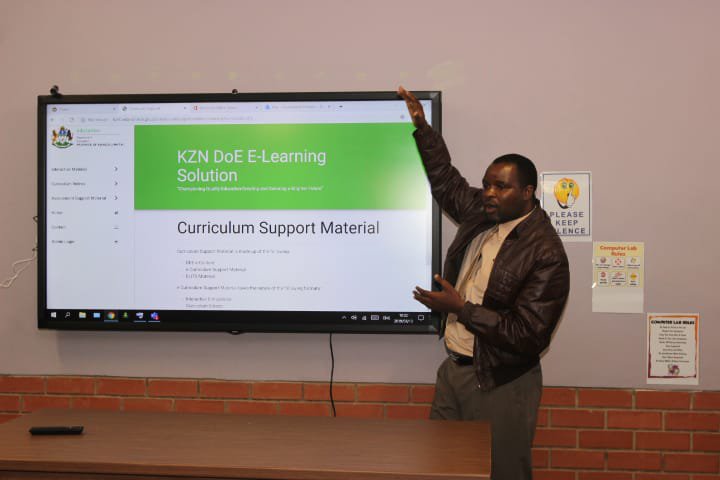Basic Education: Technology in classrooms ‘no longer an option’
Updated | By Anastasi Mokgobu
The Department of Basic Education says the Covid-19 pandemic has exposed the technological backlog at schools around the country.

Pupils were forced to stay at home after the outbreak of coronavirus in March forced the government to close schools for nearly four months.
Basic Education Minister Angie Motshekga’s spokesperson Hope Mokgatlhe says the department made the lives and health of pupils a priority – while also trying to save the academic year.
"The Department of Basic Education has learned many lessons since Covid-19 was discovered in March.
"We had to work under pressure to recover the time that was lost. We had to slowly return learners to school considering the safety and the fact that the curriculum had to be covered.
“The department decided with the help and guidance of health that it is possible to go back to school and we have learned resilient that our parents and learners wanted to go to school to save the academic year.”
CURRICULUM
Mokgatlhe says the only way the department was able to save the academic year was by trimming the curriculum.
"It is still a difficult year, the timetable has changed, holidays have changed, there is a shorter time and we are worried about learners, mostly those who are in the exit point like grade 7 and 12.
"The curriculum had to be trimmed, it was not possible to have as much time as the other classes before had. The minister met with stakeholders, provincial MECs over a long period, and it was agreed that teaching and learning can continue with safety protocols that is why we had to close and when we opened for the last time the most important thing we had to do was to consider the curriculum.”
LISTEN TO HOPE MOKGATLHE BELOW:
COVID-19 A WAKE-UP CALL
Mokgatlhe says the pandemic has shown the need for the department to ensure teachers and pupils have access to more technological resources in the classroom.
"The training of teachers in technology and ICT has been in place, it is ongoing. We have a whole unit of teacher development but what Covid-19 has taught us is that it is not a slow process of learning how to use the computer and how to teach using technology, it is now imperative, it is now the only thing we can do.”
She says many teachers had to make use of the little resources they had, such as WhatsApp.
"Many teachers had to be on WhatsApp if schools can afford to have a WhatsApp group to run schools. But we had many schools in rural areas who didn't have those resources, there was a lot of schools in rural areas that didn't even have computers.
"The department had to sit down and realise that as much this technology is important, it is not available at every school. Luckily enough we had a large number of stakeholders and partners that came and said we know this is a problem and partnered with department to ensure that each school have at least a computer or laptop.
"Covid-19 was indeed a wake-up call for the department to say technology is not optional anymore, every learner, every teacher need to know how to use technology."
SOLUTIONS /IMPLEMENTATION IN RURAL SCHOOLS
Mokgatlhe says the target is to ensure that all 27,000 public schools have the necessary technology.
"We want to ensure that all learners are able to use computers, applications and tablets. That is why we introduced coding and robotics for schools that can be able to have access and teach.
“What we need now is to ensure that our infrastructure allows. We are working with other departments from water etc to see rural schools also using technological resources.”
ALSO READ
De Lille: Expropriation Bill provides for courts to intervene on compensation
De Lille briefed the media in Cape Town on Sunday. She was part of an inter-ministerial committee which gave feedback on the outcomes of Saturday's meeting that was chaired by Deputy President David Mabuza.

Show's Stories
-
'Don't mess with my dad': Girl's version of classic song
This daddy-daughter duo reworked the lyrics of the popular 2002 song by ...
The Workzone with Alex Jay 2 hours ago -
Crocodile wors anyone? A popular meat choice for many in SA
Would Crocodile Dundee give the thumbs up to crocodile wors?
The Workzone with Alex Jay 3 hours ago